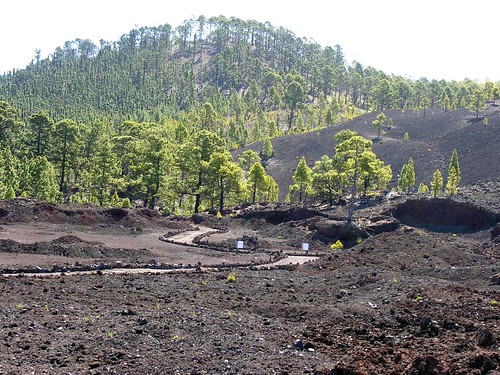
Destruction and death followed by rebirth and recovery – not a particularly bad weather forecast, just the natural cycle of life. Tenerife is a great place to witness this miracle, so determined to make the most of my football free weeks, I packed my knapsack and headed for the hills today.
There are many regular walking groups in the south, I made the short early jaunt down to Los Cristianos to join 8 other keen explorers. They surprised me, whisking us off to Chinyero, up above my old home ground of Puerto Santiago. Keen historians will know the name Chinyero as the scene of the last eruption of Mount Teide in October 1909. Don’t expect a fanfare and neon signs to welcome you to the starting point, just take the TF 38 from Chinyero to Boca de Tauce and by a sharp bend at KM 15 you will find a run off at the side of the road to park and head down to the entrance to the protected zone crested by high rising pine trees.
Following the rough but well maintained path as it meandered up through the majestic pines I savoured the still calm as I picked out my footsteps through large open pine cones. There is a wonderful symmetry about nature, the rows of pine trees were almost regimental in their neat rows, an army of green marching with one purpose. There is a wealth of options all well sign posted but our goal was the concentric Montaña Estrecho, affectionately known as Corkscrew Mountain.
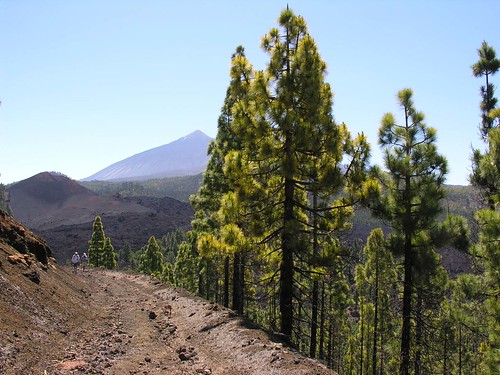
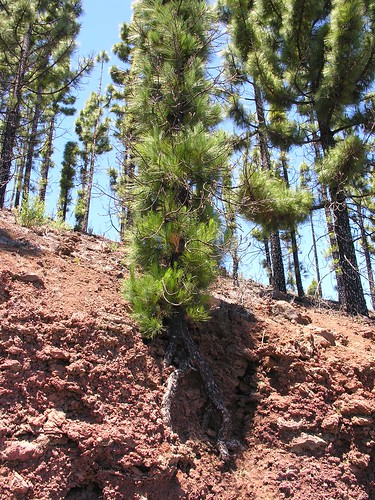

As the trail wound its way upwards the views below became more spectacular, rising above the pines we could see Mount Teide flecked with just a small brush stroke of snow but as imposing as ever. There were plenty of scorched and blackened tree trunks from the fire that swept through this area in July 2007. Even in the midst of this charcoal testament, young shoots of new life were bursting through, nature was moving on. Artists try hard to recreate the beauty of such landscapes but again nature leads the way. AÂ burnt and tumbled tree had rolled part way down the steep bank but even its sprawling branches created their own impressive still life sculpture.
Reaching the top of the 307 metre corkscrew climb we took a breather in the shadow of an old water pumping station and caught up with water and snacks. Looking down into the valley was like a glimpse into history, the march of the lava flow had carved its way through the greenery, splitting to go around boulders that blocked its way. Then many years later man had built roads that brushed the solid rock aside and pathways that followed the points of least resistance to explore this historic map.

Â
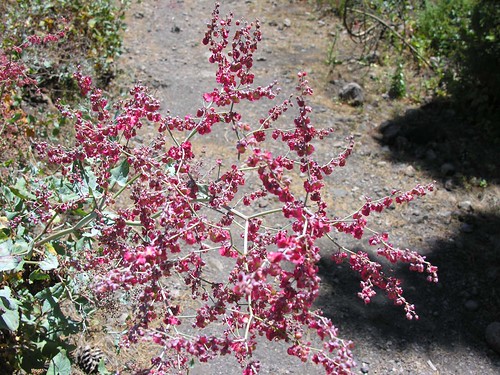
Heading back down, there were points where the roots of the trees had burst their way through the red honeycombed rock that lined the walkway. Faced with another choice we spurned a quick return route to push on into the main lava field, after a brief exploration of a tempting track that reached up towards Teide. Flowers were more abundant here, pictured above are Hierba de Roberto ( related to the Geranium) and Rumex Maderensis (a type of Sorrel) and a few yellow butterflies danced overhead. Thanks to Steve Andrews AKA The Bard Of Ely for his botanical knowledge. Once in the lava field the ground was much harder and tested our nimble footwork. A path of sorts had been marked out, edged with large stones through the dark barren wasteland from the earths belly.
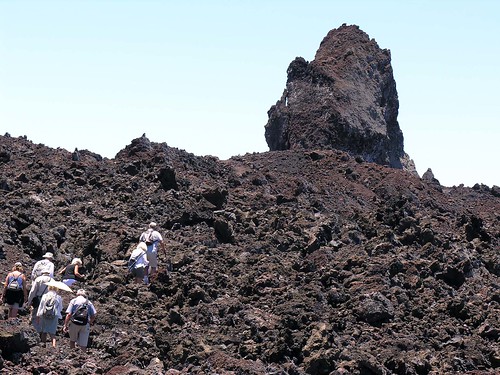
A flash of coloured lycra from passing cyclists signalled out return to the greener, flatter and more comfortable route back to our start point. Our smooth walking rhythm restored and the main road in sight, we were soon back on the almost deserted highway and ready to leave. A backward glance and a twinge of pride over rode the pull of the leg muscles after the three and a half hour voyage of discovery. One more contrast awaited me as I headed down to Las Vistas beach in Los Cristianos for a swim and a wallow near the more familiar face of Tenerife.